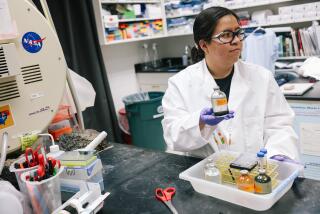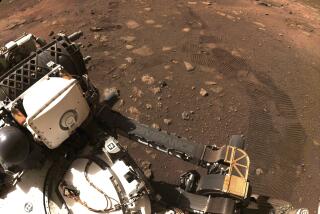Student Helps NASA Plan Travel to Mars
- Share via
Alex Iglecia, 21, is playing a part in the push for manned exploration of Mars, designing fuel systems for astronauts to use on their long journey into space.
Iglecia, only the second Moorpark High School graduate to attend Cornell University, has spent the last several months on a NASA project, trying to surmount the challenges that come with manned space exploration.
Iglecia and eight of his classmates make up one of 12 university teams chosen for a project aimed at involving students in seeking better ways of launching people across vast distances of space.
“It was a great semester with some really long hours,” Iglecia said. “I slept in the space science center three days a week, for about three weeks. Then, the last week, we [hardly slept] at all. I told people I was on Mars.”
The senior, who is studying materials science and mechanical engineering, began working in January 1997 on a land rover that will retrieve samples from Martian soil, a job that led to a position with Jet Propulsion Laboratories in Pasadena this summer.
“I’m now working on sample transfer change,” Iglecia said, which includes “getting the samples into a canister, and the canister goes into an ascent vehicle, which gets launched into orbit,” he said.
Iglecia’s work on the Athena rover also opened the door to NASA’s Human Exploration and Development of Space-University Partners program and Cornell’s involvement in exploring alternative fuel sources.
The Cornell team designed a direct-methanol fuel system that creates methanol by combining carbon dioxide from the Martian atmosphere with hydrogen carried aboard the spacecraft. The astronauts’ life-support and communication systems would use methanol as a fuel source.
“Using that, we can make a fuel on Mars using Martian resources,” he said. “The lighter we make our fuel-cell system and the less stuff we have to take to Mars, the better.”
Iglecia’s team presented its findings at the Mars Forum, held in late April at the Lunar and Planetary Institute in Houston.
“We were the first to present, and we had a lot of complimentary feedback throughout the weekend,” he said. “People really liked it.”
Now that summer’s here, Iglecia has more on his mind than collecting Martian soil.
“I’m looking forward to the beach,” he said. “I’m really looking forward to going to work. [JPL is] starting me a week later than I wanted to, but that’s OK.”
Iglecia hopes the team decides to take another crack at the space-university partners project in what will be his last semester at school, before he turns his eyes toward the future.
He said he hopes his materials science degree leads to a career in communications, engineering or the field he originally envisioned when he entered Cornell: building snowboards.
More to Read
Sign up for Essential California
The most important California stories and recommendations in your inbox every morning.
You may occasionally receive promotional content from the Los Angeles Times.










